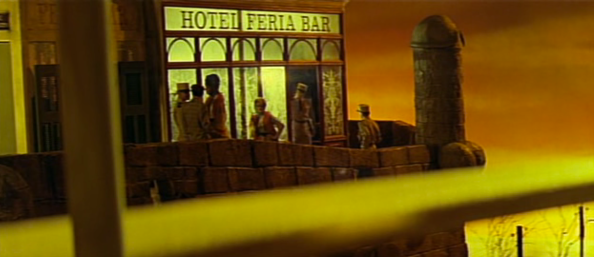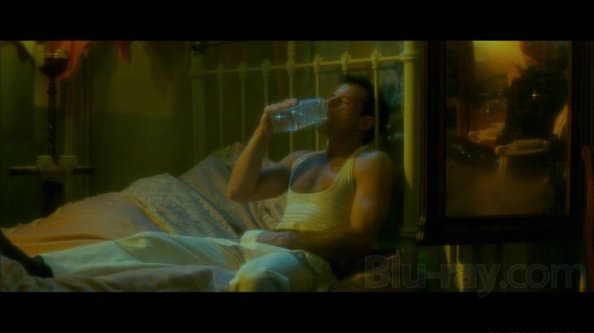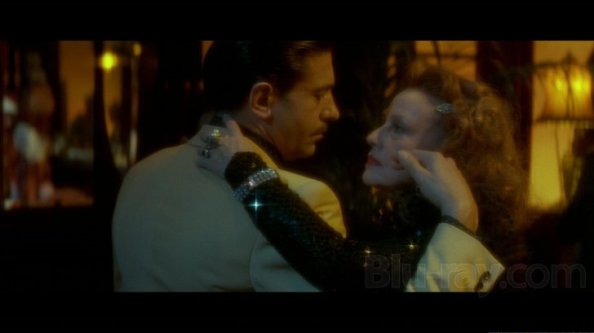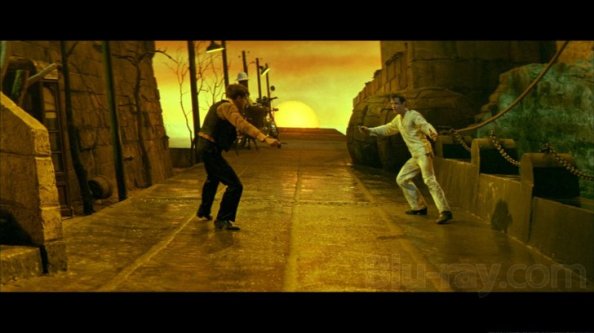Querelle – Fassbinder does Genet. (film review)
Lisa Thatcher
Writer
Posted on January 8, 2013

“Objectivity is the partner of total power.”
How does one value the quality of a film? If film is art, then like all art, it’s value can’t necessarily be measured in as pure quantifiable logic but must be felt. And yet those “feelings” need to be of a certain quality. It needs to challenge, have you see things you didn’t know where there before, offer alternate views and inspire other thinking artists to create. For these reasons Querelle is another Fassbinder masterpiece. I haven’t read the Genet novel, however it will be an interesting journey given the obviously great efforts Fassbinder has gone to in order to offer an interpretation of the novel.
Much of the film reminded me of Dogville and Manderlay by Lars Von Trier, who was a great Fassbinder fan and no doubt had to have been influenced by Querelle. Filming of Querelle takes place on an artificial stage giving the film the look a play throughout – or rather an opera as Fassbider was obsessed with at the time. This is theatre in many ways, rather than film, and at its heart it’s a horrific grand drama. Fassbinder died just after editing, and its unsure if it was an accidental overdose or a deliberate one. In so many ways Querelle is his opus, it represents the culmination of a lifetime of work as well as a distinct turn into new territory.

The plot is as follows (taken from Jim’s reviews):
Querelle is the tale of a beautiful, proud and hard-as-nails loner, the sailor Querelle (Brad Davis, Midnight Express – this is one of Fassbinder’s few films shot in English), whose commanding officer, Lieutenant Seblon (Franco Nero, Camelot), is obsessed with him. Querelle turns on his drug-smuggling partner and murders him. He goes to a notorious brothel run by the rapacious Lysiane (Jeanne Moreau, Jules and Jim), who leads him into his first homosexual encounter, with her husband Nono (Günther Kaufmann). Lysiane is madly in love with Querelle, but takes his brother Robert (Hanno Pöschl) as a substitute. Robert and Querelle have an incestuous relationship, which they try to hide. Later, Querelle falls in love with a fellow murderer, Gil, who bears an uncanny resemblance to his brother (both Robert and Gil are played by Hanno Pöschl). Gil is having an affair with an angelic young man named Roger (Laurent Male). Querelle’s increasing passion for Gil, the first man he has loved, panics him, so he betrays him to the police. But by now Querelle has become vulnerable, and he at last allows himself to submit to Seblon.

Querelle’s characters are perverse, the palate and composition extreme, the emotion wildly intense. This is a violent film filled with graphic sex and long operatic style dialogue about love and death and betrayal. It’s an adaptation of Genets book, rather than an obedient interpretation. The closing caption in a film frequently dotted with captions, is purely about Jean Genet and is reverential, almost using hushed tones. Fassbinder has altered some of the last names of certain characters to further the homage played. We have Theo Celine, Roger Bataille and Vic Rivette added to the cast of thanks Fassbinder wanted to make with this film. Genet’s book is a surreal daring piece of dream fever that Fassbinder captures in the chintzy lighting and the freakish sets - the fort where most of the action is set boasts ten-foot granite dildos as its imposing image of defence. Imposed also is a kind of Greek chorus of voice-overs that compete for narrative space. These are sometimes quotes taken from Genet, or Plutarch – as with Genet’s novel, nothing is as it appears on the surface. Each different narration style implies an internal, external and heavenly voice-over for our own lives, the implication being we are all on a stage, acting out our individual dramas.

The overcrowded stage gives a claustrophobic feeling of complete control being exerted over a façade leading to total chaos. It’s an unsettling visual mix Fassbinder creates by retaining total control over the making of the film himself. Self-restraint, self-respect, any sane forms of human interaction have all been jettisoned in favour of the nightmarish quality of human abandon. Where Fassbinder didn’t hold back in the past with his judgement, one of the things that marks this film as such an important turning point is that Fassbinder offers us the ugliest aspect of humanity warts and all, and leaves it to the subconscious to fill in the judgemental blanks. It works of course, but it is a desperate shame this is the only film we get to see his talents at work this way. Most of all, Querelle is Fassbinder open and bleeding in partnership with Genet. He is plumbing the depths of Genets mind here and allowing for his own vulnerability. The result is an intense and shocking film. A masterpiece indeed.




No hay comentarios:
Publicar un comentario